Search Results for Tag: Russia
Why high suicide rates in Arctic Russia?
Back at DW headquarters in Bonn after returning from Arctic Frontiers in Tromso at the weekend, I am sorting out notes and interviews with a wide range of experts on Arctic issues from all over the world.
One interview I would like to share with you here on the Ice Blog is a talk I had with Dr Yuri Sumarokov from the Northern State Medical University in Archangelsk in north-west Russia. It is the northernmost medical school in Russia and has a special focus on research into Arctic medicine and issues affecting the health of people in the Arctic.
People in the Arctic regions of Russia have a much higher suicide rate than in other parts of the country. The rate is higher again amongst indigenous people. Sumarakov, himself a medical doctor, shared some insights into the ongoing research with me. The topic is not new and certainly not limited to Russia. It seems though to be a topic that is not talked about enough, especially amongst politicians – and in the media. So let’s make a start. Please have a listen. There is plenty of food for thought and I for one feel motivated to find out a little more:
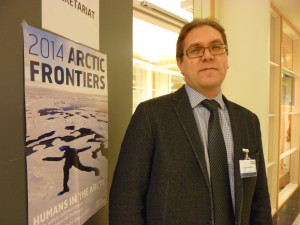
Yuri Sumarokov, MD, is Head of the Dept. of International Cooperation at Northern State Medical University (NSMU), Russia.
Canada and Russia rippling muscles in the Arctic
Enjoying my morning tea the other day, my attention was caught by an Arctic headline in our local newspaper. When the Arctic makes its way into a publication I read rather for its regional flavour than international current affairs, I get the feeling there are certainly things afoot. Or is it just that stories involving Russia and any possible military conflict appeal to the public at the moment? The story was the latest sabre-rattling by Vladimir Putin, saying Russia would be stepping up its military presence in the Arctic to defend the country’s geopolitical interests.
The Kremlin chief has been turning into a bit of a public enemy number one here, with the arrest of the “Arctic 30” and refusal to comply with the international maritime tribunal, the pressure on the Ukraine to keep away from the EU and the publicity of the treatment of homosexuals in the run-up to the winter Olympics. Now the big, bad Russians are sending soldiers up to the North Pole, that iconic supposedly untouched frozen waste at the top of the planet, which belongs to no country. Not so far anyway.
We remember how a Russian submarine planted its flag on the seabed under the North Pole in 2007. Back in 2001 Russia submitted a claim to extend its nautical borders to the UN commission on the limits of its continental shelf. In the meantime, the rapidly warming climate has increased the international race to get at Arctic resources and develop an infrastructure to profit from increased shipping through the area.
I do find it a matter of concern that Russia is re-opening military bases in the Arctic and has sent warships up there for the first time in more than 20 years. Luke Harding in the Guardian links Russia’s renewed interest in the region directly to Putin’s ascent to the Kremlin in 2000. In contrast to the policies under Dmitry Medvedev, “Putin’s Arctic rhetoric has been hawkish”, Harding writes. The same can be said of Canada’s conservative prime minister Stephen Harper. Canada has just submitted its claim to the UN Commission and says it will actually be laying claim to the North Pole soon. As current chair of the Arctic Council, Canada has been stressing the need to develop the region. This week I talked to a Canadian colleague, who was flabbergasted by the latest Canadian antics concerning the High North. His scepticism was based on what he sees as a huge discrepancy between the might of Putin’s Russia and a Canada with limited military resources.![]()
![]() Let us hope that military power is not what will decide the struggle for the North Pole and the Arctic in general. If the countries put as much effort into reducing emissions and developing climate-friendly technologies as into military developments – and I am thinking of political rhetoric and pr as much as actual spending – the Arctic might be able to continue to be the remote, frozen area at the top of the world with its unique ecosystems preserved for future generations.
Let us hope that military power is not what will decide the struggle for the North Pole and the Arctic in general. If the countries put as much effort into reducing emissions and developing climate-friendly technologies as into military developments – and I am thinking of political rhetoric and pr as much as actual spending – the Arctic might be able to continue to be the remote, frozen area at the top of the world with its unique ecosystems preserved for future generations.![]()
Lanterns out for Arctic protesters
I have just come back from Bonn, where Greenpeace supporters joined in their own version of the traditional lantern processions which take place here at this time. Children and parents carry home made lanterns to mark St.Martin’s day, in memory of the saint who cut his cloak in half to give warmth to a beggar. In the Greenpeace marches held across Germany today, the marchers were swinging their lanterns in an appeal for the release of the Arctic 30, the crew of the Arctic Sunrise still under arrest in Russia. The procession in Bonn was heading for the Russian consulate here. It was a well timed event, marking two months of imprisonment for the peaceful protesters and the UN climate conference in Warsaw at the halfway mark.
Greenpeace: Pirates, Hooligans – what next?
If it didn’t involve thirty committed conservationists being imprisoned and intimidated, I might be inclined to see the Russian authorities’ behaviour as something of a farce. Russia has now dropped allegations of piracy, but accused the activists of hooliganism, which still carries a long jail sentence. Pirates? Hooligans? What will they come up with next in their effort to keep the crew of the Arctic Sunrise in jail and hammer home the message that Russia takes its Arctic interests very seriously? The absurdity of the charges against protesters on behalf of an organisation famous for its often spectacular but always unarmed and peaceful demonstrations in the cause of environmental protection tells us a lot about Russia’s attitude towards the Arctic. “Russia takes on Greenpeace – and stakes its claim to the Arctic” is the headline of an article by Simon Shuster for Time World , which suggests Greenpeace met with the disproportionately harsh response because the Arctic oil rig protest came at a time when Russia was asserting its military presence in the Arctic – against a background of growing economic interest. Moscow has opened its first permanent military base in the Arctic since the fall of the Soviet Union. The Greenpeace stunt “gave Russia just the opportunity it needed to underscore the message of Admiral Kololyov (commander of Russia’s northern fleet): Do not tread on the Russian north”, Shuster writes. Indeed.
Shuster quotes Vladimir Chuprov, head of Greenpeace Russia, as admitting the timing of the protest “may have been inopportune”. Greenpeace chief Kumi Naidoo, who was personally involved in a similar protest last year, has stressed the organisation did not expect such a harsh response.There are those who criticize Greenpeace for staging the protest. Greenpeace critic Mika Mered, CEO of Polaris Consulting, writes in a commentary for the Arctic Journal Moscow’s reaction was “perfectly predictable”. Whether it was predictable or not – the treatment of the activists is drawing massive attention to what is happening in the High North. The race is in full swing for access to the Arctic’s resources. Research into the environmental impacts of oil and gas drilling and transport on the fragile Arctic eco-system and the development of technology to cope with a possible oil spill in icy waters are struggling to keep pace with the rapidity of commercial development. The Russian reaction to the Greenpeace protest has drawn widespread media and public attention to the rapidly growing international economic and political interest in the Arctic. More than any scaling of an oil rig alone could ever have done. And in the run-up to the next round of UN climate talks in Poland next month, let us not forget that it is climate change, caused to a large extent by the burning of fossil fuels, that is making the race for Arctic oil and gas possible.(No wonder UN Climate Chief Christina Figueras was reduced to tears by the lack of inaction on climate the other day).
Meanwhile, on a more positive note, a survey conducted by the Kremlin-backed Public Opinion Foundation on October 13th showed that 69 percent of Russians favour making the Arctic region a neutral zone – outside the control of sovereign states. See Moscow Times.
Also worth reading: “High North or High Tension”by retired US Navy Admiral James Stavridis in Foreign Policy.com. If we want to keep the peace in the Arctic, he says, “we have some work to do”.
Russia to evacuate floating ice station
Russia is preparing to evacuate a crew of 16 from a drifting Arctic research station because the ice floe it is sitting on has started to disintegrate. The news agency AFP said Natural Resources and Ecology Minister Sergei Donskoi had set a three-day deadline to draft an evacuation plan for the North Pole-40 floating station. That was yesterday afternoon. (See also Times Live for report and photo!)
“The destruction of the ice has put at risk the station’s further work and life of its staff,” the ministry said in a statement. The station is currently home to 16 personnel including oceanologists, meteorologists, engineers and a doctor. It conducts meteorological research, monitors environmental pollution and conducts a number of tests. If the situation is not addressed, it may also result in the loss of equipment and contaminate the environment near Canada’s economic zone where the station is currently located, the ministry added. The floating station is to be relocated to Bolshevik Island in the Russian Arctic with the help of an ice breaker.
Vladimir Sokolov, who oversees the floating station at the Saint Petersburg-based Arctic and Antarctic Research Institute, said the ice was disintegrating due to climate change. Russia created its first floating research station in the Arctic, the North Pole 1 in 1937. The first floating station put up by post-Soviet Russia was put together in 2003. The crew had to be rescued when the ice floe beneath it broke up in 2004.
The experts in charge say the crew’s lives are not in danger, but working conditions have become impossible. They say the fast melt of the ice is making it more difficult for research to keep pace with developments.
Not surprising, but surely another spectacular illustration of what’s happening up in the High North? Has anybody seen this making a big splash (sorry!) in the international headlines?



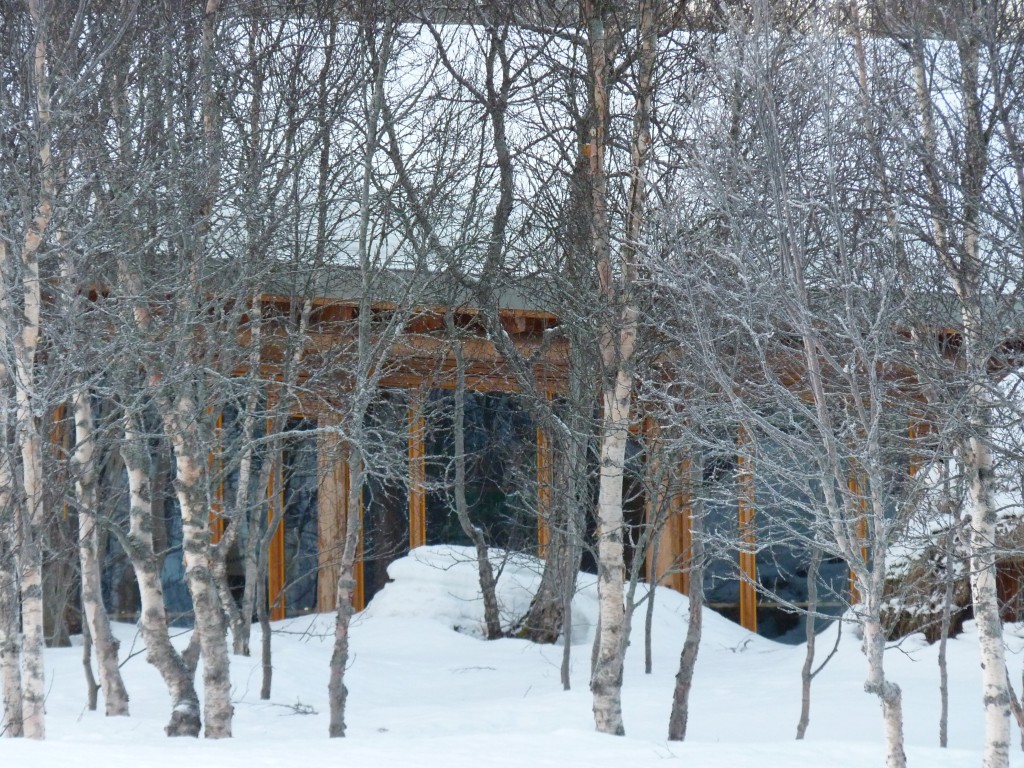



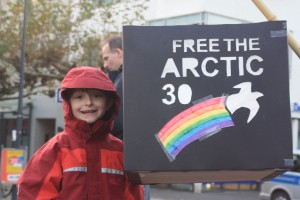


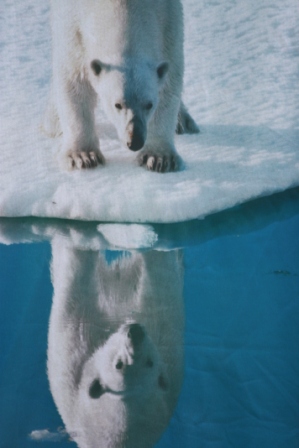
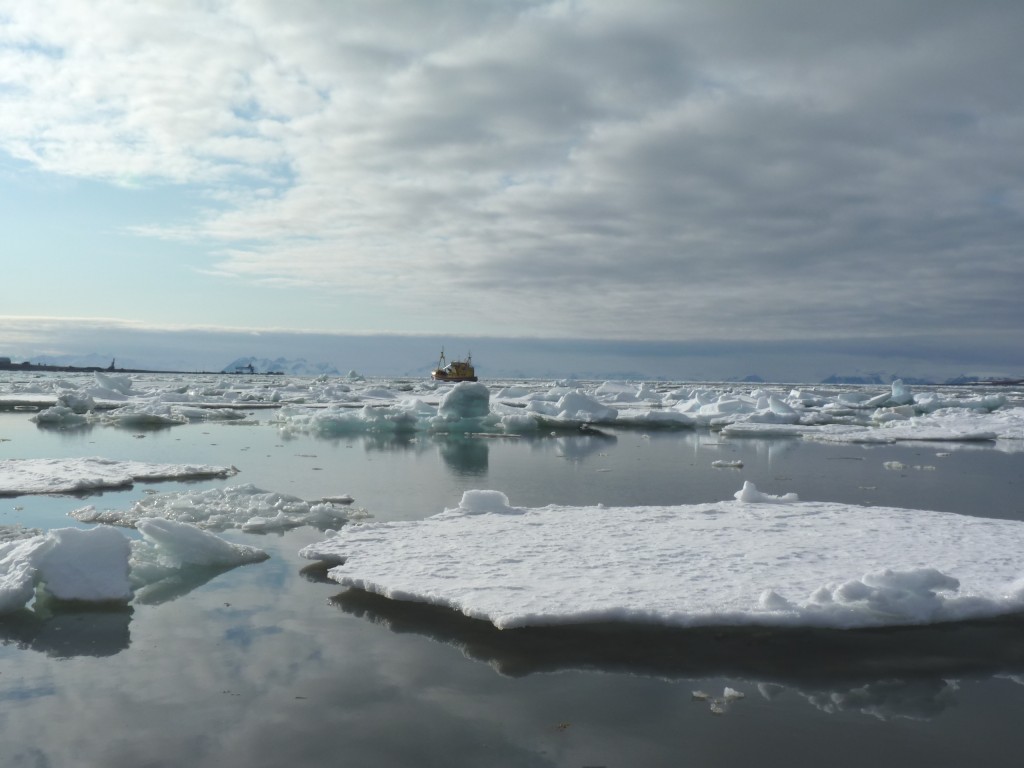
















Feedback